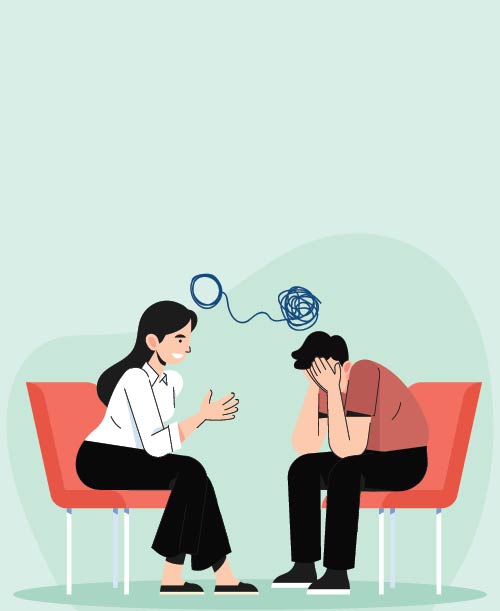The Significance of Mental Health And Wellness: a Deep Dive Into Counseling, Therapy, and Their Advantages
Mental health significantly shapes individual well-being, affecting ideas, feelings, and habits. Therapy and therapy offer as essential avenues for healing and personal advancement. They offer organized support, assisting people browse life's challenges. Several remain uninformed of the particular types of therapy readily available and their unique advantages. Understanding these aspects is necessary for any individual taking into consideration professional psychological health and wellness assistance. What complies with might illuminate paths to durability and gratification that several forget.
Comprehending Mental Health and Its Effect
Mental health and wellness is frequently forgotten, it plays an essential function in general well-being and day-to-day functioning - Marriage Counselling. It includes emotional, psychological, and social elements that affect how people believe, really feel, and behave. A person's mental wellness directly influences their capacity to take care of stress and anxiety, connect to others, and choose. Poor mental health can bring about numerous concerns, including anxiety, anxiety, and problem in keeping partnerships, all of which can hinder expert and personal growth.Furthermore, mental wellness has far-ranging effects for physical health and wellness. Chronic stress and anxiety and untreated psychological conditions can add to various physical disorders, such as heart problem and compromised immune actions. Alternatively, positive mental wellness cultivates durability, making it possible for people to manage life's challenges properly. Comprehending mental health and wellness's importance is essential for promoting encouraging environments that advertise psychological health, consequently improving the lifestyle for communities and individuals alike
The Various Sorts Of Therapy and Treatment
In the domain of mental health and wellness, various counseling and treatment types satisfy varied demands. Specific counseling methods concentrate on individual issues with individually sessions, while group treatment characteristics foster shared experiences and assistance amongst individuals. Comprehending these methods is crucial for selecting the proper treatment for different challenges.
Specific Counseling Approaches
Many individual therapy approaches exist, each developed to attend to particular psychological wellness issues and satisfy differing client demands. Cognitive Behavior Modification (CBT) concentrates on determining and changing unfavorable thought patterns, while Psychodynamic Therapy discovers previous experiences and subconscious processes. Humanistic Therapy emphasizes individual development and self-actualization, promoting an encouraging environment. Interpersonal Treatment (IPT) targets connection concerns and communication patterns to improve emotional well-being. Additionally, Approval and Commitment Therapy (ACT) encourages customers to approve their thoughts and sensations while devoting to personal values. Each method supplies distinct methods and approaches, permitting practitioners to tailor their approaches to the person, therefore boosting the therapeutic experience and promoting mental health recovery.
Group Treatment Characteristics
Team treatment dynamics encompass different restorative techniques that utilize the power of common experiences and social connections. This type of therapy often includes diverse groups, promoting a risk-free setting for participants to express thoughts and sensations. Trick sorts of group treatment consist of assistance teams, which give psychological assistance; process-oriented teams, concentrating on interpersonal interactions; and psychoeducational groups, targeted at passing on knowledge concerning mental health and wellness concerns. The characteristics within these groups can improve self-awareness, as participants usually assess their behaviors in connection to others. Additionally, team treatment cultivates a sense of belonging, minimizing sensations of seclusion. Via shared stories and cumulative analytical, individuals can establish dealing methods and acquire insights, eventually adding to private growth and healing.
The Role of Therapy in Mental Health And Wellness
Therapy plays a crucial function in mental health and wellness by supplying various approaches customized to specific demands. These techniques offer professional assistance that can cause significant renovations in emotional health. Recognizing the various kinds of counseling can assist people make informed decisions regarding their psychological wellness treatment.

Types of Counseling Approaches
While numerous counseling techniques exist, each offers one-of-a-kind techniques and insights right into psychological wellness therapy - Cognitive Behavioural Therapy. Amongst one of the most prominent are cognitive-behavioral treatment (CBT), which concentrates on modifying unfavorable idea patterns; psychodynamic treatment, which discovers subconscious procedures and childhood experiences; and humanistic approaches, stressing individual development and self-actualization. Furthermore, solution-focused short treatment prioritizes finding remedies in the present instead than delving right into problems. Team therapy fosters area and shared experiences, while family treatment addresses relational characteristics within familial structures. Each technique deals with different demands, aligning with private choices, problems, and therapeutic objectives. Recognizing these techniques helps clients make notified choices about their psychological health journey and promotes effective therapy tailored to their unique circumstances
Benefits of Specialist Advice
Many individuals gain from specialist advice in handling their mental wellness difficulties. Therapy offers a risk-free space for clients to discover their thoughts and feelings without judgment. This healing setting fosters self-awareness, permitting individuals to identify patterns in their habits and create healthier coping approaches. Professional advice additionally supplies accessibility to evidence-based techniques that can ease signs of stress and anxiety, depression, and other psychological wellness issues. Therapists can aid in establishing practical goals and provide assistance in achieving them, enhancing general well-being. The collaborative relationship between therapist and customer is crucial, as it advertises liability and encourages personal development. Ultimately, professional advice plays a vital function in steering psychological wellness journeys, bring about boosted psychological durability and life fulfillment.
Advantages of Therapy: Healing and Development

How to Select the Right Specialist or Counselor
Exactly how can one browse the typically overwhelming procedure of choosing the right therapist or counselor? Identifying individual demands is essential; people ought to consider their specific concerns, whether relationship, stress and anxiety, or anxiety difficulties. It is advantageous to research study various healing approaches, such as cognitive-behavioral therapy or psychodynamic treatment, to discover an ideal match.Next, possible clients should seek recommendations from trusted resources or make use of on the internet directories. It is important to assess specialists' credentials, including their education, licensing, and areas of specialization. Scheduling preliminary appointments can assist determine compatibility, permitting individuals to assess communication designs and personal comfort.Finally, logistical aspects, such as location, accessibility, and charges, ought to additionally be taken into consideration. have a peek at this website By thoughtfully evaluating these aspects, one can make an educated decision, ultimately cultivating a therapeutic relationship that sustains psychological health and wellness and personal growth.
Conquering Preconception: Accepting Mental Wellness Support
While societal perspectives toward mental health have actually developed, preconception still offers a substantial barrier for many seeking support. This preconception usually shows up as mistaken beliefs surrounding mental disorder, leading individuals to feel shame or concern regarding their battles. Many individuals wait to pursue counseling or treatment due to bother with being evaluated or identified. Overcoming this preconception is essential for cultivating a helpful setting where people can openly review their psychological health needs.Communities and companies play an essential duty in this transformation by advertising awareness and education concerning mental health and wellness concerns. Initiatives that highlight personal stories can humanize these experiences, urging others to seek aid without anxiety. As acceptance grows, individuals may really feel more encouraged to embrace psychological health and wellness assistance, acknowledging it as a crucial element of general health. By taking apart stigma, society can cultivate a society of understanding, compassion, and positive mental wellness care.
Methods for Keeping Psychological Wellness Beyond Therapy
Although treatment gives valuable assistance, preserving psychological wellness beyond sessions is similarly crucial. People can implement several techniques to sustain their mental wellness. Routine exercise plays an important role, as exercise promotes the launch of endorphins, which boost state of mind. Additionally, a well balanced diet plan abundant in nutrients can significantly affect psychological stability and energy levels.Practicing mindfulness and meditation assists people handle stress and develop greater self-awareness. Establishing a consistent rest regimen is likewise basic, as high quality remainder is crucial for cognitive feature and emotional regulation.Engaging in social activities fosters link and decreases feelings of seclusion. Seeking rate of interests or pastimes can offer an innovative outlet and increase self-worth. Practicing and establishing reasonable objectives self-compassion allows individuals to grow durability. By integrating these strategies into day-to-day life, individuals can successfully support their mental health beyond treatment sessions.
Frequently Asked Questions

How Can I Inform if I Need Treatment?

Determining the need for therapy typically entails identifying consistent sensations of unhappiness, anxiety, or frustrating stress and anxiety. If everyday functioning comes to be tough or coping mechanisms stop working, looking for expert assistance may be a helpful advance.
What Should I Anticipate in My Very First Treatment Session?
In the first therapy session, individuals can expect an introduction, discussion address of their factors for looking for aid, and a review of the specialist's strategy, creating a structure for future discussions and establishing convenience in the therapeutic room.
Are Online Therapy Sessions as Effective as In-Person Ones?
Research study suggests that online treatment sessions can be as reliable as in-person ones. Factors such as the therapist's credentials, client interaction, and the healing connection considerably influence results, regardless of the tool used.
Can Therapy Aid With Partnership Concerns?
Therapy can help people in resolving connection problems by giving devices for communication, recognizing feelings, and fixing disputes. Mental Health Resources. It promotes healthier dynamics and encourages individual development, eventually fostering more powerful, more meeting links in between partners
Exactly How Long Does Therapy Typically Last?
Therapy duration varies substantially based on specific demands and goals. Normally, sessions might last from a few weeks to numerous months, with some people taking part in ongoing therapy to attend to long-lasting worries and individual growth. Cognitive Behavior Treatment (CBT) focuses on recognizing and changing adverse thought patterns, while Psychodynamic Therapy checks out subconscious procedures and past experiences. Key types of team these details therapy include assistance groups, which offer emotional assistance; process-oriented groups, concentrating on interpersonal interactions; and psychoeducational groups, aimed at giving understanding concerning psychological wellness issues. Among the most famous are cognitive-behavioral therapy (CBT), which focuses on altering unfavorable idea patterns; psychodynamic therapy, which discovers unconscious processes and childhood years experiences; and humanistic approaches, emphasizing individual growth and self-actualization. Team therapy cultivates neighborhood and shared experiences, while family therapy addresses relational characteristics within familial structures. It is helpful to study different therapeutic techniques, such as cognitive-behavioral therapy or psychodynamic therapy, to locate an appropriate match.Next, possible customers should seek referrals from relied on resources or utilize on the internet directory sites.